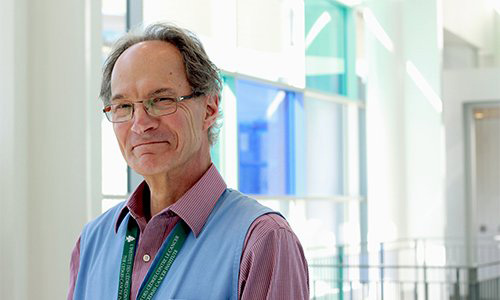A dedicated volunteer recounts his experiences with patients near the end of their lives

By Patricia Vasquez, MUHC Public Affairs
Every Tuesday, wearing his traditional blue jacket, 65-year-old Jean-Pierre Fournier arrives at the Palliative Care Unit of the McGill University Health Centre’s Royal Victoria Hospital (RVH-MUHC). He has been a dedicated volunteer of the unit for 13 years.
Even though he is an accountant by training, Fournier is no stranger to hospitals. In fact, he was an executive at a long-term-care centre (CHSLD) for close to three decades. For him, a palliative care facility is far more than a healthcare unit; it’s a place where he feels a true community spirit resides.
Even closer to home, Fournier was by his sister Louise’s side as she battled brain cancer in 2001. With his professional and personal experience he knew he wanted to help those in their final stages of life. “I truly believe that it is a privilege to be with people during these last steps,” he says.
Fournier started volunteering in March 2003 at the RVH-MUHC. When the Palliative Care Unit moved to the Montreal General Hospital, he followed. Then in April 2015 he again migrated to the new Glen site where he devotes seven hours a week, to the Palliative Care Unit. “I also go to conferences about palliative care,” he says. “And I read a lot about the subject — I keep informed. It’s something that is very meaningful to me.”
In addition to seeking out information, Fournier also gleans lessons from his volunteer work. “Through my time with this patient population I have learned to appreciate every minute as if it were my last,” he says “I don’t question every decision anymore and I’m not going to miss any opportunities that come my way. Palliative care has taught me to live every moment to its fullest.”
Always smiling, Fournier goes from room to room visiting patients and offering a very personal kind of support. After all these years, the palliative care unit has become familiar territory for this man who does his work with utter humility.
“I would say that we, the volunteers, don’t even keep track of the time we spend with each person” he says. “We aren’t part of the medical staff or the specialists; what counts is to be there for the patients and to be on the same wave length as they are.”
Fournier also says that he feels there’s a great deal of life and liveliness in the unit. According to him, patients that find themselves there don’t give off an air of sadness, that people do their best to keep the energy positive.
“I always say that my real life only started at the Palliative Care Unit of the Royal Victoria Hospital,” he says. “It is here I learned to really live life.”
May 12, 2016
